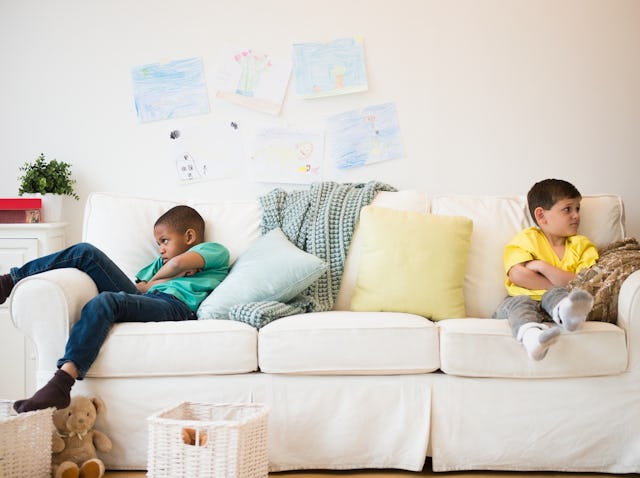Wait, Is My Child The Bully? 8 Signs An Expert Says You Shouldn’t Ignore
Bullying behaviors left unchecked tend to worsen with age, and no parent wants to raise a jerk.

In early October, Scary Mommy tapped family therapist and behavior analyst Laurie Singer for insights on how to tell if a child is being bullied, leaving readers with this additional food for thought: What if my kid is the bully? Any parent of a child that’s been on the receiving end of bullying knows just how heartbreaking of a situation it is — but it’s no easier to be the parent of the bully either. And much like children who are bullied, it can be difficult for parents to spot the signs of a bully when it’s their kid, let alone know what to do about it.
If you think your child may be showing signs of being a bully or just want to be prepared to spot any potential red flags before they manifest into a bigger problem, keep reading to find out what Singer had to say when Scary Mommy followed up with her.
Why It’s Important to Consider the Possibility
“It’s essential that parents monitor the behavior of their children in all facets, and bullying is no different. They should look for signs, for as young as preschool-aged children, to identify if their child is engaging in bullying behavior,” says Singer, adding that parents and caregivers should aim to be objective when observing their child.
Opportunities to look for signs that your kid might be a bully can happen both inside and outside the home. Singer recommends that parents pay close attention to their child’s behavior anytime that they are with peers — including siblings — monitoring and making sure that they are following appropriate social conduct. She also shared some potentially concerning signs that parents shouldn’t ignore.
Because some of these behaviors are normal for kids, especially very young kids, parents should exercise common sense when using them as measures to assess their child.
Signs Your Child Might Be A Bully
- Does not respect personal space
- Pushes or hits peers
- Does not wait their turn in line, or to use a toy or ride
- Takes things away from peers
- Dominates every interaction with peers
- Peers don’t want to play with them
- Doesn’t get invited to events
- Notes/phone calls from school
Finding a Solution
Singer says that bullying behaviors that are left unchecked tend to worsen with age and can even be carried into adulthood. No parent wants their child to be left out of peer activities or lose friendships, or worse, grow up to be a complete jerk, making monitoring and adjusting any negative behaviors at a young age imperative. “When possible, particularly for younger children, intervening the moment some type of bullying behavior takes place is most effective,” says Singer.
It might seem intuitive for parents to scold their child as a first step, but Singer says that young children are often unaware that they are doing anything wrong and that parents should approach these situations with this in mind. “Giving the child choices and letting them know how their bullying behavior affects others, along with teaching a new behavior, is very important,” explains Singer, adding that, for example, if a child cuts in line at the park, parents should intervene by explaining to their child why that behavior is not OK, pointing out what the better choice is, and giving them the choice of following the “rules” or taking time out from play.
And Singer says that praising a child for good behavior is the best route to take, whenever possible, suggesting, “Be specific and let the child know what the behavior was that you liked. Specific praise will increase the likelihood the child will engage in appropriate behavior even when the parent is not around.”
Where to Turn for Help
Getting other adults involved in the child’s life helps create consistent expectations from your child. So Singer says that parents should make all adults, caregivers, and school personnel aware that they are working on specific behaviors with their child and ask them to contribute towards the goal as well.
If your child’s bullying behavior persists, consider scheduling an appointment with a child behaviorist, therapist, psychologist, or psychiatrist who can better help you evaluate and address any underlying causes of your kid’s behavior.
This article was originally published on